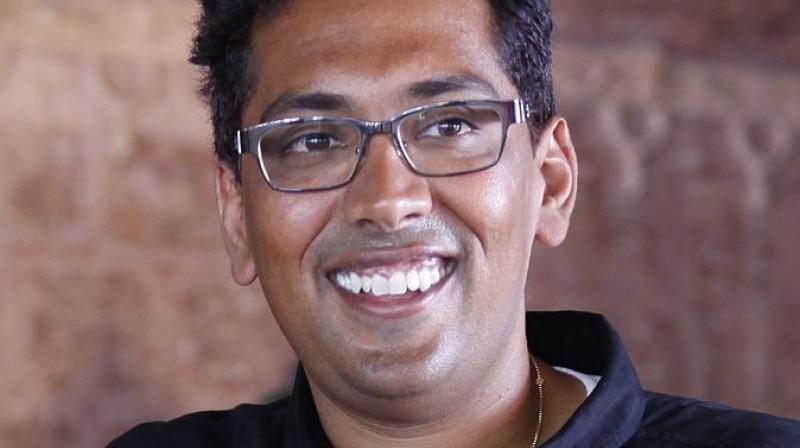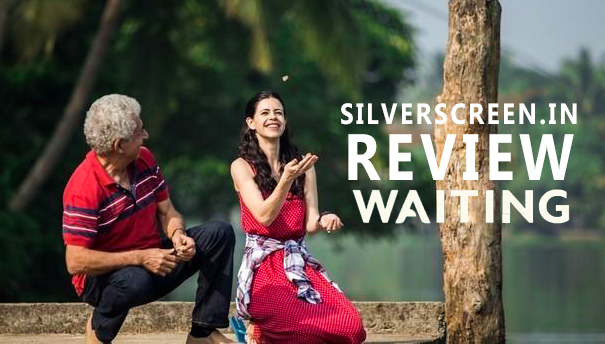It isn’t easy to get hold of 36-year old debutant filmmaker Vijay Kumar. Not since Uriyadi released. The gripping tale of four college students caught in the chaos of caste politics struck all the right chords with audiences. Positive reviews have poured in, and the screen count keeps increasing.
We talk to Vijay about how Uriyadi was made, why he picked the year 1999 to depict caste issues, and what he loves most about the reception to his first film.
“I have thousands of PROs for the film today. Almost everyone who watched the film is recommending it to others, as if it was their own film. I get tweets about how much they liked the film, I’m not able to find time to get back to all of them. It might seem like I’m bragging, but it is the truth,” he laughs.
Uriyadi, apart from its gritty storyline, was memorable for the way college culture was depicted. Unlike the usual college stories in films, Uriyadi had characters from small towns, shown enjoying hostel life. We ask Vijay, who also plays one of the leads, whether the characters were drawn from real life.
“The Vijay you see in the film is the real me. I was also a student of metallurgy. I was the type of engineering student who has no clue about why he chose the subject. Metallurgy has more scope only in North India. I decided to stay put in Tamil Nadu, and worked my way to an IT company. After 8 long years, I turned to my passion: films. In 2008, when Canon 5D was launched, I made a short film. After that came a brief stint with Naalaya Iyakkunar. It was cut short due to an accident. In 2010, I quit my job. Ever since then, I’ve been working on scripts.
I was so organised that whatever I had in my mind, I would transfer it to the script. I wouldn’t miss a single detail; from the costumes to the set properties. If there was a pen used in the scene, I would note down what type of pen it was. I knew that I wouldn’t be able to afford a big art department, so I had to make sure I got all the details right.
I didn’t approach a producer because I knew that I wouldn’t get any creative freedom. I took my family’s support. Sivaji style, we sold some of our properties to fund the film. In the middle, it even began to look like Sivaji’s interval scene!”
Vijay had an interesting method for auditioning actors. For some parts, he narrowed it down to 2-3 people. Then he offered the part to the actor who was economically struggling the most.
“I don’t think of it as doing a favour. It’s like a responsibility. The only reason I’m mentioning this is because, perhaps, someone else might do the same. Right?”
The detailed planning ensured that pre-production was a cakewalk. But, Vijay says the shooting period was like walking through fire.
“First, there were the unexpected rains, which ruined far too many shoots. Next, there was the issue of having only newcomers on sets. It meant we needed several retakes for the perfect shot. And then, the film is set in 1999, and most of my scenes are outdoors, I had to make sure that no 2016-specific elements show up on screen. This also meant several retakes. Despite all this, I managed to complete the shoot in a single schedule, and within the anticipated time-frame.”
When even big-budget films jostle for a good release date, we ask Vijay how he dealt with the hassles of releasing Uriyadi.
“Making a film is easier than making sure it releases. Whether the film is good or not matters very little. You need to have the right contacts. It’s like the ‘Ponnu Paakara’ ceremony, where suitors come and look at the woman, and decide whether they want to get married or not. Distributors would come, watch the film, tell me it was a good film, but that the audience wouldn’t like it. That confused me. They liked it. Everyone did. Then why wouldn’t the audience like it?
Anyway, all the frustration led me to Nalan Kumarasamy, whom I knew through Naalaya Iyakkunar. He and Karthik Subbaraj watched the film, and gave it a standing ovation! It still feels amazing when I remember that. After a lot of fine-tuning, we decided to replace the songs. That’s how Masala Coffee came into the project.”
Even today, caste-based issues are a raging menace in India, and Tamil Nadu is no exception. We ask Vijay Kumar why he chose to set his story in 1999, when the story would have been current even in 2016.
“I did that just so you would ask me this question! The answer is simple: Caste issues have been happening since forever. 1937, 1999, 2016, 2037; doesn’t matter what year it is, it keeps continuing. So I just picked a year. It’s definitely not because I feared any repercussions, if I set it in 2016. If that was the case, I wouldn’t have chosen this subject at all.”
Had this been an established director’s 100th film, people would have raved about his bold choice of subject. Vijay, however, did it in his first film.

“I respect every second of my time. When I knew I was going to spend at least three years of my life on this film, I decided that it had to be worth that time. It wasn’t worth my time to make a film that people may like and laugh at, and then forget the moment they step out of the movie hall. Any good film, be it comedy, horror, history, or drama, must leave the audience with something. Why else should someone come all the way from their home, spend money on your movie, and stare at the screen for over two hours?
Recommended
And yes, caste discrimination disgusts me. And people’s stupidity around it even more so. Having a caste-based party is all right, but how they use this name to their advantage, and incite fear and violence is something I wanted to show. I really wish that the film ran in more locations in rural Tamil Nadu, because that is where this message is aimed at.”
From reviews to audience responses, almost everyone has had only good things to say about Uriyadi. We ask Vijay to pick his favourite compliment, thus far.
“Honestly, I haven’t read many of the reviews. It’s just that I have seen my movie, I know what it is about, and I don’t want to read about the same thing over and over again. The audience response gave me a huge high. Even yesterday, I watched a night show at a theatre, house full; and everyone said things like, “Boss, super boss!” I love how everyone talks about Uriyadi like it’s their own film. I’m lucky to have that.”
*****



